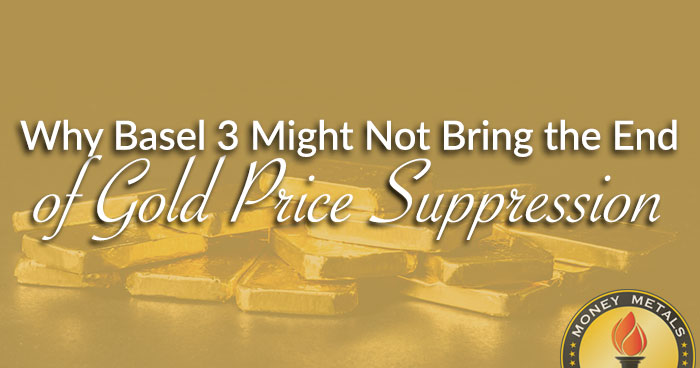Much hope has been engendered in the monetary metals sector by the "Basel 3" banking regulations being recommended to the world by the Bank for International Settlements since the regulations might make prohibitively expensive the business of unallocated or "paper" gold – the business of creating vast supplies of imaginary gold for price suppression purposes.
The regulations are said to be taking effect in Europe at the end of June and likely in the United Kingdom, the headquarters of bullion banking, at the end of the year.
The conclusion that the Basel 3 rules will smash the "paper" gold system is drawn not just by advocates of liberating the gold market from price suppression but also by the proprietors of the "paper" gold business themselves, the London Bullion Market Association and the World Gold Council, which the other day issued a panic-stricken public protest.
But even if this interpretation of the Basel 3 rules is correct, Basel 3 might not necessarily stop gold price suppression by governments and central banks.
The LBMA banks create the "paper" gold for price suppression purposes and provide camouflage for central bank interventions. In exchange, the LBMA banks have been essentially underwritten in their gold dealings by certain central banks that arrange gold swaps and leases for them.
These interventions can't work as well without such camouflage. For if central banks had to intervene directly and openly to control the gold price and protect their currencies, intervention would be visible and more easily defeated by the market.
That openness is what helped the collapse of the London Gold Pool in March 1968…
…and is why the secret March 1999 staff report of the International Monetary Fund warned against requiring central banks to disclose their gold swaps and leases – disclosure would expose their interventions, and their interventions wouldn't work very long if they couldn't deceive the markets:
But central banks probably could find mechanisms other than the LBMA for creating "paper" gold and imaginary supply.
Indeed, even in the era of the gold standard governments didn't back their currencies with gold at a 100 percent ratio.
They managed with gold coverage of well less than 50 percent, trusting that responsible monetary and fiscal policy would suppress demand – and they were right. That is, the gold standard itself was a fractional-reserve gold banking system, though its coverage level was far higher than it is in today's gold banking system, where there may be as many as 90 or 100 claims to every ounce of gold.
So central banks hoping to continue gold price suppression might exempt their banks or certain of their banks from the Basel 3 rules on gold.
These exemptions might be kept secret, and such banks might get secret government guarantees. With such guarantees, these banks might function perfectly well while providing camouflage for interventions.
Of course, this would be fraud, but the whole system is already a fraud, As early as 1961 Federal Reserve officials were secretly proposing falsifying U.S. government records to facilitate manipulation of the gold market.
Or, since the Basel 3 rules would choke the bullion bank business in "paper" gold by requiring those banks to hold enormous collateral against their "paper" gold obligations, perhaps central banks engaging in gold price manipulation could simply supply that collateral to the bullion banks via huge cash deposits, thereby relieving Basel 3's increased costs to the banks.
After all, central banks have no trouble creating money. They just "type it in" and wire it out and are perfectly able to deploy it in secret, even in nominally democratic countries like the United States.
This week, outstanding analyst Alasdair Macleod wondered aloud if the BIS knows what it's doing to the gold market with Basel 3: potentially destroying the fractional-reserve gold banking system.
If the BIS didn't know when devising the new rules, it surely knows now because of the anguished protest from the LBMA and/or WGC.
But it is hard to imagine that the BIS didn't contemplate such an impact from the start. After all, as GATA consultant Robert Lambourne long has shown, the BIS is a key player in the gold market, a gold broker for central banks helping to manage their interventions every day, and a crucial part of their camouflage:
Besides, Basel 3's rules for gold banking are entirely sensible for their recognition that "paper" gold creates a huge systemic risk for the international banking system.
One big buyer of physical gold – a sovereign or even an ordinary billionaire, might crash the system by purchasing and taking delivery of enough real metal, since all the bullion banks are short, are connected by their derivatives, and might be pulled down together.
Averting such a systemic collapse by helping bullion banks cover their huge short positions as the gold market reversed upward seems to have been the purpose of the Bank of England's strange gold-selling program in 1999.
The Bank of England lost a fortune for the United Kingdom by selling so much of its gold reserves at the bottom of the market, but it accomplished something considered much more important than the national interest: It saved the banks.
So Basel 3's rules for gold banking prompt questions about the BIS' underlying intent.
Is BIS' gold policy now being set by a majority of directors from countries that are sick of U.S. dollar imperialism, the increasing "weaponization" of the dollar, and want to weaken the world reserve currency to diminish U.S. power?
Are the Basel 3 gold rules an attack by European Union members on London bullion banks in resentment of the United Kingdom's withdrawal from the EU?
Are the Basel 3 gold rules meant to precipitate the sort of resetting of the international financial system envisioned years ago by the U.S. economists Paul Brodsky and Lee Quaintance and the Scottish economist Peter Millar, a resetting in which currencies and debt are devalued but governments are reliquefied against their debts by assigning much higher values to their gold reserves?
Various interests are likely in play here. Since mainstream financial news organizations don't dare to do serious journalism about central banks and gold, outsiders can only speculate about what is happening in that snake pit.
It all may evoke the legend about the Congress of Vienna, which in 1814 aimed to redraw Europe's borders after the Napoleonic wars. Understandably enough, the congress was rife with intrigue. Supposedly one day an aide visited the Austrian foreign minister, Klemens von Metternich, and reported: "My Lord, the Russian ambassador has died."
Metternich supposedly answered: "Hmmm. ... I wonder what his motive was."
Since central banking is conducted in secret, at least we can be sure that nobody's motives here are good.

About the Author:
Chris Powell is a political columnist and former managing editor at the Journal Inquirer, a daily newspaper in Manchester, Connecticut, USA, where he has worked since graduating from high school in 1967. His column is published in newspapers throughout Connecticut. He is also secretary/treasurer of the Gold Anti-Trust Action Committee Inc., (GATA) which he co-founded in 1999 to expose and oppose the rigging of the gold market by Western central banks and their investment bank agents.





